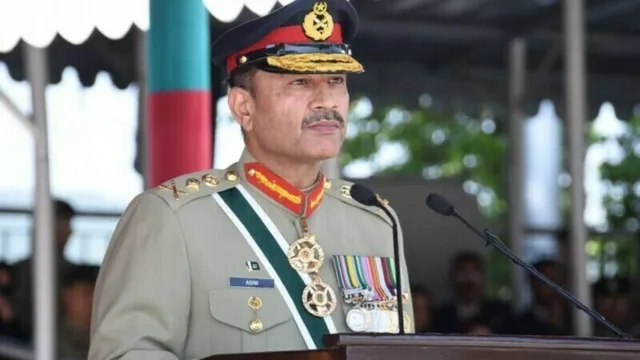- By Supratik Das
- Tue, 20 May 2025 06:32 PM (IST)
- Source:JND
Army Chief General Asim Munir has been promoted to the rank of Field Marshal, Pakistan's highest military title, just days after a deadly escalation with India. This move has sparked controversy and raised questions about the country's civil-military imbalance. The move was announced by the Pakistan Prime Minister's Office on Tuesday after a cabinet meeting presided over by Prime Minister Shehbaz Sharif. State television PTV reported, attributing Munir's "exemplary leadership" during the recent conflict with cross-border tensions as the reason for the historic promotion.
The timing of General Munir’s promotion has raised serious concerns across diplomatic and strategic circles. The development comes even after Pakistan broke a US-brokered ceasefire with India, just hours after it was reached. Pakistani forces resumed shelling at the Line of Control (LoC) and even sent armed drones into Indian airspace on May 10, according to India's Ministry of External Affairs (MEA). This ceasefire violation came after India's retaliatory military strike, called Operation Sindoor, following the Pahalgam terror attack, in which 26 civilians were killed.
This move indicates that the promotion of General Munir is a symbolic reinforcement of military supremacy over the civilian administration. This has again raised the question for Pakistan's democracy: Who holds real power in Islamabad, the elected government or the Rawalpindi military high command?
Really A Civilian Government?
The post-independence history of Pakistan is full of military takeovers. Pakistan has had three outright military coups and over three decades of martial law since 1947. No Prime Minister has ever served a full five-year term in office. Even at times, Pakistan's military has dominated the country's national security, foreign affairs, media regulation, and even the appointments of judges.
• The First Military Coup: In 1958, when President Iskander Mirza suspended the Constitution and declared martial law, appointing General Ayub Khan Chief Martial Law Administrator. Ayub Khan overthrew Mirza in a few weeks and established an 11-year military regime.
• Bhutto's Fall and Zia-ul-Haq's Rise: General Zia-ul-Haq deposed Prime Minister Zulfikar Ali Bhutto, alleging electoral fraud and political turmoil. Bhutto was subsequently sentenced to death controversially and executed in 1979. Zia governed Pakistan until he died in a plane crash in 1988.
• Musharraf's Takeover: The Pakistan military ousted Nawaz Sharif, suspended the constitution, and placed General Pervez Musharraf in power as the nation's new chief. He remained in charge until he resigned in 2008.
• Imran Khan's Removal: In April 2022, Imran Khan was ousted from power through a no-confidence vote over disagreement over foreign policy and Khan's aggressive opposition to top army generals.
With General Asim Munir assuming the influential rank of Field Marshal, questions are abuzz as to whether Pakistan is moving toward another era of direct or indirect military rule.

